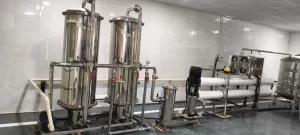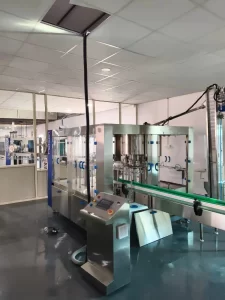For more than ten years, Metson Machines have been producing packaged drinking water with a single mission: to deliver safe, hygienic, and reliable water to families, businesses, and communities. Over this time, we have watched the industry evolve from small manual setups to high-capacity automatic plants that now define quality and efficiency.
Our automatic drinking water bottling plant is the result of this evolution. With advanced purification technology, precision automation, and sustainable operations, we ensure that every drop reaching our customers is pure, consistent, and trustworthy.
What Is an Automatic Drinking Water Bottling Plant and Why It Matters
An automatic drinking water bottling plant is a facility where raw water undergoes advanced purification and is bottled with minimal human contact. Automation ensures higher hygiene, faster production, and consistent quality that manual methods cannot achieve.
Key Benefits of Automatic Bottling Plants Over Manual Systems
-
Consistent product quality across every bottle
-
High-speed production for large-scale demand
-
Maximum hygiene with minimal human handling
-
Lower risk of contamination or operational errors
-
Faster return on investment for businesses
Comparison Table: Manual vs Semi-Automatic vs Fully Automatic Water Plants
| Feature | Manual Plant | Semi-Automatic Plant | Fully Automatic Plant |
|---|---|---|---|
| Human Involvement | High | Medium | Very Low |
| Hygiene | Moderate | Good | Excellent |
| Output Capacity | <1,000 bottles/hour | 1,000–5,000 bottles/hour | 5,000–20,000+ bottles/hour |
| Accuracy | Variable | Improved | Precise |
| ROI | Slow | Medium | Fast |
How Automatic Drinking Water Bottling Plants Work – Step by Step Process
Over our decade-long journey, we have refined every stage of production to ensure the highest standards of purity and efficiency.
Raw Water Collection and Quality Testing Before Bottling
-
Sources: Borewell, municipal supply, or natural water bodies
-
Tests Conducted: pH, TDS, hardness, turbidity, microbial load
-
Purpose: Ensures purification strategy and compliance with safety standards
Multi-Stage Water Purification for Packaged Drinking Water
| Stage | Purpose | Key Benefit |
|---|---|---|
| Sand Filtration | Remove sand, silt, dirt | Clear water, protects RO membranes |
| Activated Carbon Filter | Remove odor, taste, chlorine, organics | Better taste, odor-free water |
| Reverse Osmosis (RO) | Remove dissolved salts, heavy metals, TDS | Safe, pure water |
| UV Treatment | Kill bacteria, viruses, protozoa | Microbiologically safe water |
| Ozonation | Sterilize and preserve freshness | Long shelf life, no chemical residue |
PET Bottle Manufacturing and Sterilization Process
-
PET blowing machines produce uniform bottles in-house
-
Bottles sterilized using disinfectants and UV light
High-Speed Automatic Bottle Filling and Capping System
-
Bottles filled at precise volumes
-
Automatic capping ensures tight, contamination-free sealing
Labeling, Batch Coding, and Safe Packaging for Distribution
-
Branded labels applied for consumer recognition
-
Batch numbers and expiry dates printed for traceability
-
Carton packing or shrink wrapping ensures safe transport
Infrastructure and Setup Requirements for a Drinking Water Bottling Plant
Land, Machinery, and Power Needs for Bottling Plant Installation
-
Land: 2,000–10,000 sq. ft. depending on scale
-
Power Supply: 30–100 kW
-
Water Source: Reliable and tested
-
Waste Disposal: Effluent Treatment Plant (ETP) for compliance
Licenses and Certifications Required for Packaged Drinking Water Business
We operate with all essential licenses and certifications, ensuring our water is trusted and legally compliant.
-
BIS Certification – Mandatory for packaged drinking water
-
FSSAI License – Food safety compliance
-
ISO & HACCP – International quality and safety standards
-
Local Approvals – Pollution control and municipal clearances
Investment and Profitability of Automatic Bottling Plant Business
Cost Breakdown for Setting Up a 1000 LPH – 20,000 LPH Water Bottling Plant (in INR)
| Plant Capacity | Machinery | Land & Civil | Utilities | Licensing & Lab |
|---|---|---|---|---|
| 1,000 LPH | ₹20,00,000 – ₹50,00,000 | ₹10,00,000 – ₹30,00,000 | ₹4,00,000 – ₹10,00,000 | ₹2,00,000 – ₹5,00,000 |
| 5,000 LPH | ₹80,00,000 – ₹2,00,00,000 | ₹40,00,000 – ₹1,20,00,000 | ₹16,00,000 – ₹40,00,000 | ₹8,00,000 – ₹24,00,000 |
| 10,000 LPH | ₹1,60,00,000 – ₹4,00,00,000 | ₹80,00,000 – ₹2,40,00,000 | ₹32,00,000 – ₹80,00,000 | ₹16,00,000 – ₹48,00,000 |
| 20,000 LPH | ₹3,20,00,000 – ₹8,00,00,000 | ₹1,60,00,000 – ₹4,80,00,000 | ₹64,00,000 – ₹1,60,00,000 | ₹32,00,000 – ₹96,00,000 |
Monthly Operating Costs and Revenue Streams in Bottled Water Business (in INR)
Electricity & Water: ₹40,000 – ₹16,00,000 depending on plant capacity
Labor: ₹60,000 – ₹32,00,000 depending on plant capacity
Packaging: ₹1,00,000 – ₹48,00,000 depending on scale and bottle size
Logistics: Variable based on distribution network and region
Revenue streams include:
Retail bottles (200 ml – 2 L)
Bulk jars (5 L – 20 L)
Private label partnerships
ROI: How Long to Recover Investment in a Bottling Plant
Most fully automatic plants recover investment within 2–4 years, depending on production scale, distribution efficiency, and market demand.
Sustainable and Eco-Friendly Innovations in Our Bottling Plant
Sustainability is at the heart of our operations.
Water Recycling and Zero Liquid Discharge (ZLD) Systems
Treated wastewater is reused for cleaning, cooling, and other utilities
No harmful discharge into the environment
Energy-Efficient and Green Packaging Practices in Bottled Water Industry
Solar-powered operations for reduced electricity costs
Lightweight PET bottles to minimize plastic waste
Ongoing research into biodegradable and recyclable packaging alternatives
Why Choose Our Bottling Plant Services – A Decade of Experience and Trust
-
10+ Years of experience serving diverse markets
-
BIS, FSSAI, ISO, HACCP certified production
-
Capacity to deliver thousands of bottles per hour
-
Strong distribution network trusted by families and businesses
-
Scalable solutions for both small and large requirements
Frequently Asked Questions About Automatic Drinking Water Bottling Plant
Q1. How long have you been in this industry?
We have been operating for over 10 years, continuously upgrading our processes with modern technology.
Q2. What is the difference between packaged drinking water and mineral water?
Packaged drinking water is purified using RO, UV, and ozone, while mineral water is naturally sourced and retains its minerals.
Q3. What is the shelf life of bottled water?
Between 6–12 months, depending on packaging and storage.
Q4. What capacity plant should I start with?
Small-scale plants start at 500 LPH, while automatic plants can handle up to 20,000+ LPH.
Q5. How profitable is a bottled water business?
Highly profitable. Most plants recover their investment within 2–3 years.
Q6. How much does it cost to set up a drinking water bottling plant?
A 5,000 LPH fully automatic plant may cost $200,000–$500,000 depending on land, machinery, and utilities.
Q7. Which licenses are required for a packaged drinking water plant?
BIS certification, FSSAI license, ISO & HACCP certifications, and local pollution/municipal clearances.
Q8. What machinery is used in an automatic bottling plant?
RO purification system, UV sterilizer, ozonator, PET blowing machine, bottle washing unit, automatic filling and capping machine, labeling and shrink-wrapping equipment.
Q9. Can I start a water plant business at a small scale?
Yes. Many start with 500–1,000 LPH plants and scale as demand increases.
Q10. How can I ensure water quality remains consistent?
Use multi-stage purification (RO, UV, ozone) and daily lab testing. Our decade of experience shows this builds long-term customer trust.
Q11. What are the biggest challenges in running a water bottling business?
Maintaining compliance, controlling costs, ensuring logistics efficiency, and managing sustainability.
Q12. What are the environmental considerations for bottled water plants?
Water conservation, energy-efficient systems, and eco-friendly packaging.
Finalization
For more than a decade, we have been committed to delivering safe, pure, and reliable bottled water. Our automatic drinking water bottling plant is not just a facility, but the outcome of years of expertise, technological refinement, and community trust. When you choose our water, you are choosing purity, experience, and responsibility. Every bottle we produce is bottled with care and delivered with trust.



